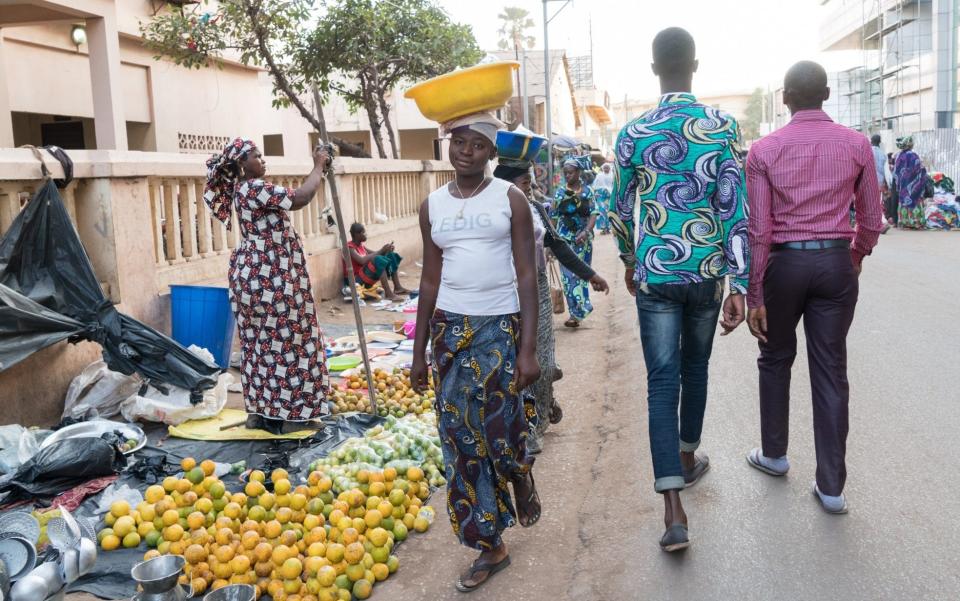'Hunted for my sexuality': How social media is fuelling homophobic attacks in Mali

The film is grainy but the viewer can make out shadows looming over a woman cowering in fear. Men are shouting, hitting and demanding that their victim admits she is gay. A few neighbours walk past. They carry on as if nothing is happening.
The woman struggles to regain her balance, arms protecting her head from the blows. The white trainers used as weapons glow in the dark. So do the lights of the many smartphones filming her.
“Stop it, it’s enough,” someone says. “This is what you called me for, right?” his accomplice replies. The majority wants to carry on.
In a final blow, the men throw the woman back onto the pavement and strip her naked, snapping the final, most humiliating pictures they will use to feed the anti-LGBT pages mushrooming on Malian social media.
That last photo of Laura Drabo*, naked, head in her hands and her nose bleeding, was posted on a Facebook page in April last year, drawing comments applauding the violence, and calling for her death, from some of the page’s nearly 2,000 followers.

Over a year later, photos and videos from that night can still be found online. A quick search brings up dozens more shots of her, which have been shared online against her will since 2017, she says.
Some, like the April 2018 video, feature violence. Others show her posing with make-up and her signature long, colourful fake nails and appear to have been taken by friends or loved ones. These, she says, were stolen from her accounts.
It was one such photo, posted in the summer of 2017, which marked the start of the witch-hunt. Soon afterwards, the 22-year-old transgender woman started being recognised on the streets of her home city, Bamako, so she moved to Abidjan, the capital of the Ivory Coast. There, the Malian diaspora shared her every move - and offered a 1,500 euro reward for finding her.
They did find her, eventually. In the past two years, she has stopped counting the times she has been attacked. “I want to go out, but I can’t. Every time I go out, it is the same thing. People recognise me,” she told the Telegraph.
Her trauma is shared by many LGBT people in the Malian capital, who watch in disbelief as the number of homophobic accounts grow day after day.
For many of them, 2017 came to be known as “the year of the crisis,” when the violence they had already been experiencing became entwined with, and made worse by, online abuse.
Several Facebook pages using the French acronym LCHM - which stands for Fight Against Homosexuality in Mali - started outing homosexuals, real or suspected, to families and friends. Sometimes, they posted their names and addresses. Videos of beatings were shared and watched by thousands.

“That was the start of a hunt for homosexuals, people were asking around for information,” said Lassana Sidibé*, the coordinator of Mali’s Coalition Against AIDS (CAS), which monitors violence against LGBT people.
More than 700 outing videos and photos were posted online over 2017 and 2018, according to the group. In the same period, 90 people were assaulted.
Anyone who was gay, transgender, non-conforming or simply perceived as such feared they would be next. Malian law does not specifically prohibit same-sex relations, but it is extremely taboo in the conservative, majority-Muslim West African nation. And there are no laws to protect sexual minorities from discrimination.
In a 2007 Pew Research Center survey, 98 per cent of Malians said homosexuality should be rejected. A single online post was almost always guaranteed to result in young men and women being thrown out of family houses, rejected by friends, neighbours and even attacked on the streets.
So they made themselves invisible. They dressed like society expected them to. They started restricting their social media use, out of fear their private information could be stolen. Facebook became thought of as too risky, and WhatsApp use strictly limited to one-on-one chats.

“People who want homosexuality here in Mali, people will burn them,” Mohamed Kebe, a member of Mali’s High Islamic Council who organised the February meeting, told the Telegraph.
This was the second street protest over LGBT rights in a matter of months, after thousands took to the streets of Bamako in December to oppose the sex-education textbook.
But the LCHM anti-homosexuality group denies it ever promoted violence. “On the internet, you must have seen that there are a lot of LCHM groups, on Youtube, on Facebook. All of this, that's not us,” said a spokesperson for the charity, which numbers “a few hundred people.”
“There are young people in the neighbourhood who are starting to practise homosexuality… These are not African values, especially not Malian values,” he added. “We never asked anyone to beat up anyone, we never told anyone to use violence against homosexuals.”
Back in Ivory Coast, Laura Drabo mostly goes out after sunset, so she can sell herself to make a bit of money to pay for the wooden hut she calls home.
After years of harassment, she refuses to hide who she is. “Even now that I’m here, I always have my fake nails, my fake eyelashes, I don’t even have boy clothes,” she says.
“Why would I stop? My decision is made.”
* Not their real names.
Protect yourself and your family by learning more about Global Health Security
